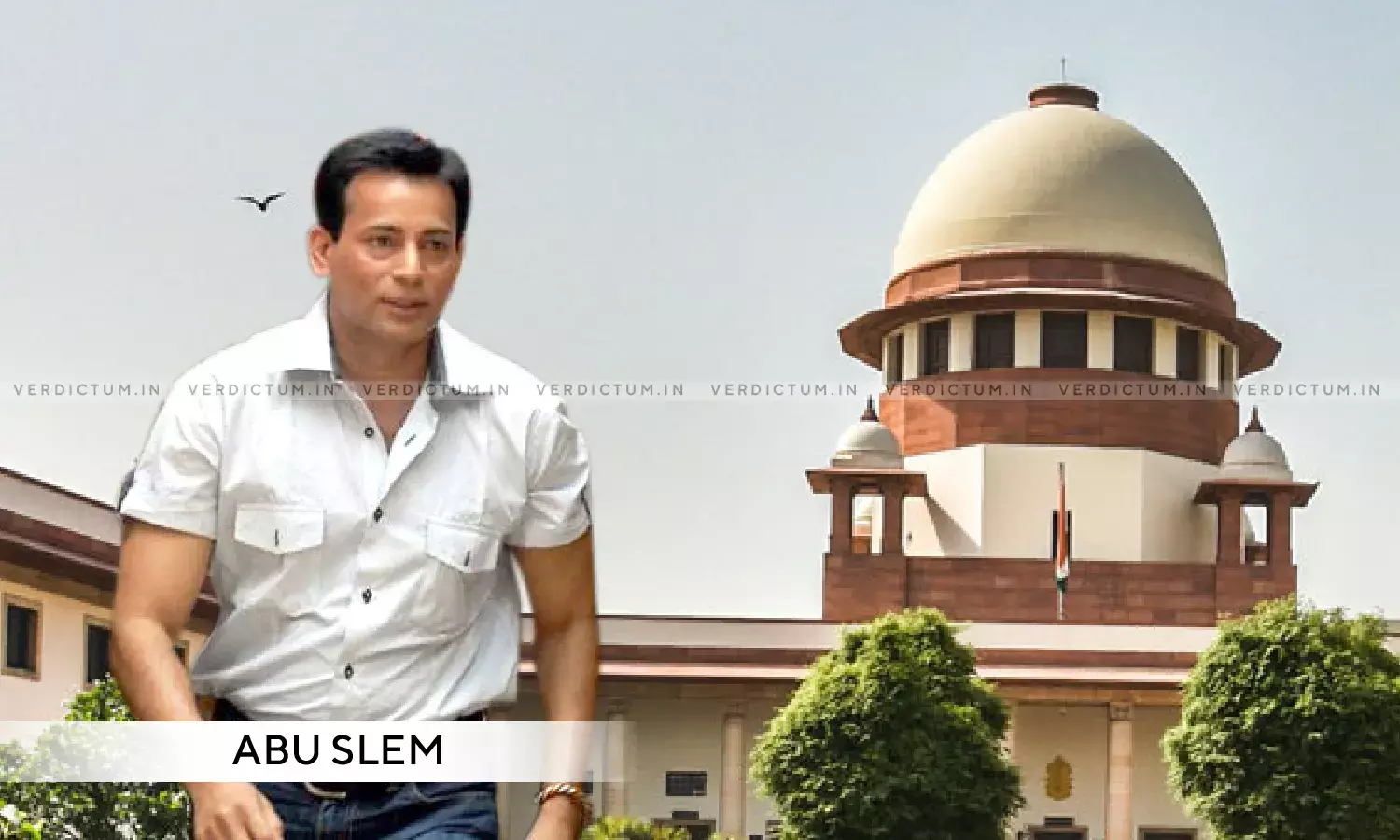Supreme Court Directs Union Home Secretary To File Affidavit In Abu Salem's Plea By April 18

The Supreme Court today directed the Union Home Secretary to file an affidavit by April 18 on whether it is going to abide by the solemn assurance given by the then deputy Prime Minister L K Advani to the Portugal government that the maximum sentence handed out to gangster Abu Salem will not exceed 25 years.
A Bench of Justice Sanjay Kishan Kaul and Justice M M Sundresh granted a "last opportunity" to the Centre after Solicitor General Tushar Mehta told the Bench that there was some communication gap.
The Court expressed anguish over the delay in filing the affidavit and said,"This is not fair. If your home secretary is so busy we can have him here."
"Solicitor General Tushar Mehta submits that there was some communication gap on their part and the affidavit of the Union home secretary shall be filed on or before April 18, 2022 as a last opportunity," the Bench said in its order.
During the hearing, Mehta took objection to the submission of the counsel for the other side on submitting the affidavit by Wednesday. The Solicitor General said that the period of 25 years is coming to an end in 2027 and if remission is not granted its coming to an end in 2030. He (counsel for the other side) cannot dictate the Court, Mehta said.
The Court said that the Court's time schedule should be respected and added,"Please advise them. We are not concerned because of this individual case. We are concerned because of the ramifications. Please examine that your processes in other cases should not get impeded."
The matter is listed for hearing on April 21. The Court had earlier asked the Centre to make its stand clear on the issue.
It had said that the stand on the commitment made by the Union of India would have wide ramifications the next time the country wants to bring back any fugitive. The Court had said that it is not satisfied with the affidavit filed by the Central Bureau of Investigation (CBI) which said that the assurance given by India to Portugal on the maximum sentence during the extradition of Salem, a convict in the 1993 Mumbai serial blast case, is not binding on Indian courts.
On February 2, the Court had sought a response from the Centre on a plea filed by Salem, serving life imprisonment for his role in the 1993 Mumbai serial blasts case, contending that his imprisonment cannot extend beyond 25 years as per the terms of the extradition treaty between India and Portugal.
It had granted four weeks to the Centre to respond on a plea by Salem claiming that the 2017 judgement of TADA court sentencing him to life imprisonment was against the terms of the extradition treaty. Salem had contended that life imprisonment awarded to Salem is against the assurance given by the Indian government to Portugal from where he was extradited.
His plea said, "Even despite the categorical assurances by the Government of India that the appellant will not be sentenced for more than 25 years which assurances formed part of judicial proceedings right till the Supreme Court of Portugal and upon which the extradition order was passed, there was a complete and gross violation by the TADA Court when it imposed sentences of life imprisonment for certain offences."
On February 25, 2015, the special TADA court had awarded Salem life imprisonment in another case for murdering Mumbai-based builder Pradeep Jain in 1995, along with his driver Mehndi Hassan.
The Court, in January 2014, had dropped some charges against Salem in the case on the request of prosecution which said that some changes need to be withdrawn to maintain cordial relations between two sovereign countries - India and Portugal.
Salem, also a convict in the 1993 Mumbai serial blasts, was extradited from Portugal on November 11, 2005, after a prolonged legal battle. The Supreme Court of Portugal, in 2012, had dismissed an appeal of the CBI which had challenged the termination of his extradition.
In June 2012, Salem was shot at in Taloja Central Jail in Navi Mumbai allegedly by gangster Devendra Jagtap alias JD, an accused in the murder case of advocate Shahid Azmi who had represented a 26/11 Mumbai attack accused.
In June 2017, Salem was convicted and later awarded a life sentence for his role in the 1993 serial blast case in Mumbai. Salem was found guilty of transporting weapons from Gujarat to Mumbai ahead of the blasts.
On March 12, 1993, the country's commercial capital had witnessed an unprecedented attack with a series of 12 bomb explosions that took place one after another in about two hours. The dastardly attacks had left 257 dead, 713 persons seriously injured, and destroyed properties worth crores.
In 2020, a Portugal court dismissed a plea of Salem claiming that the Indian government had violated the condition of his extradition.
With PTI inputs

